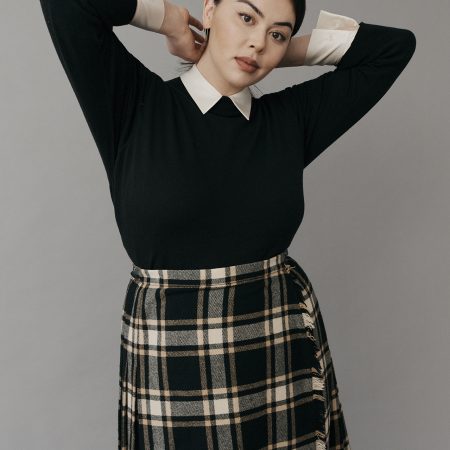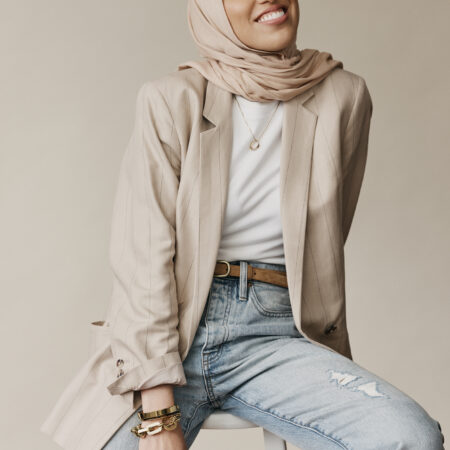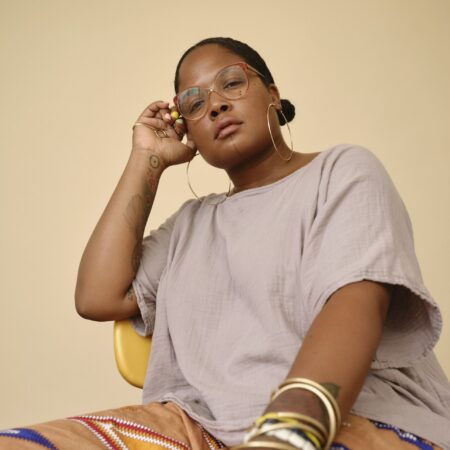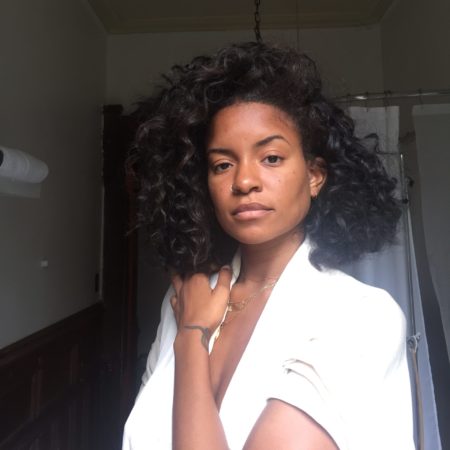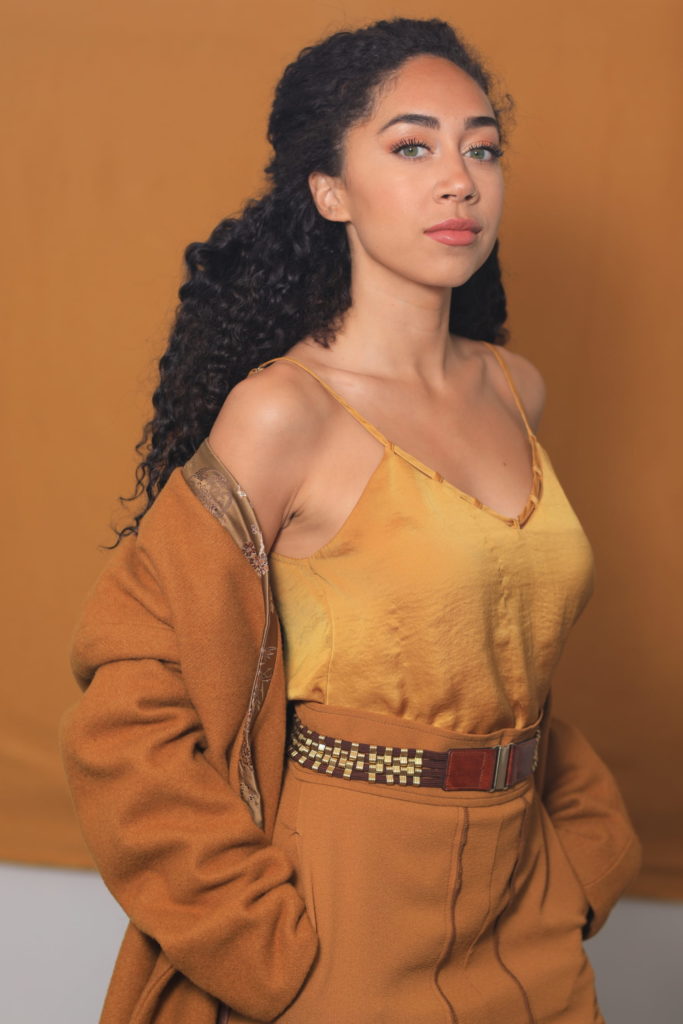
Influencers have disrupted the 9-to-5 world as a new breed of entrepreneurs, branding themselves as experts with information to sell. But Shan Boodram isn’t your typical fashion or beauty influencer. Instead, she’s schooling her 326,000 followers on female orgasms and reproductive health while proving there is big business in sex education made sexy.
Since there’s no college major or career roadmap for becoming a sexpert, Shan looked to an unexpected source for her business model inspiration: Martha Stewart. With two books under her belt, a certification in intimacy education, and a new Quibi show, Sexology With Shan Boodram, the 35-year-old is building an unconventional business empire of her own. From quitting her job in wedding photography to overcoming challenges as a woman of color, and influencing in the age of COVID-19, Shan opens up about building a profitable business on her own terms.
The Helm: You refer to yourself as “Dr. Ruth meets Rihanna.” How did you decide sex education was something you wanted to turn into a business and how did you get started?
Shan Boodram: I had a really shitty teen sex life. I was at a crossroads of realizing that either sex was exactly what the school nuns, priests, and my parents had said about it (a terrible thing that only results in pain, disease, and heartbreak), or I was doing it wrong. I didn’t have enough guidance and I needed to refresh my approach to sex. Before giving up and wearing a chastity belt forever, I got a library card and spent a summer reading every book I possibly could on sexuality. I realized there was a lot of really great information out there, but it was really fucking boring. I thought to myself, Okay, somebody should make this information sexy and fun. Sex sells but sex education does not; that’s where I saw a niche for myself to fill.
"I’m making mistakes, figuring it out, fucking up, and I’m sharing everything along the way."
The Helm: Instagram has created new opportunities for what it means to be an entrepreneur today. How have you managed to build your own brand when there’s no traditional business trajectory for you to follow?
Shan Boodram: My path wasn’t linear. I started at 19 years old and by around 24, I put out a book called Laid without a following or anything. I spent a couple of years touring the book and got some minor press for being this millennial who was talking about sex in a fresh way. At that time, I went back to school and got my certification in sex education counseling. I was working in an office space, but barely making minimum wage. My advance for my first book was like $12,000 and when you add up the years I spent writing it, plus the time and investment spent driving it around and trying to sell it, it just wasn’t a sustainable model for me. So I stopped for a few years and tried to figure out something else. I don’t know what I did between the ages of 25 and 28, but around 29 I thought, If I’m going to be poor anyway, I might as well be poor and passionate about what I’m doing. When I restarted at that time, I really understood the internet more and the role it could play in illustrating your brand. What I’m trying to become is the Martha Stewart of sex and relationships, and what I mean by that is there’s a way to interact with her brand at every level. Whether you spend $10 at K-Mart for one of her home decor items or go to her weekend getaway spots for thousands of dollars or watch her on VH1, Martha is everywhere. But wherever she is, the words DIY are not far behind. When you think of DIY, you think of Martha Stewart—there’s so much power in that. Although she wasn’t in my career path, I used her career as a guiding force for what I wanted. Rachael Ray did the same thing with cooking. Anybody who I felt really did a great job with branding themselves in a specific vertical, that’s who I looked to for guidance.
The Helm: How do you balance being both an influencer on social media and an entrepreneur? Are there any challenges that come with being both?
Shan Boodram: Sometimes you give yourself the excuse that when you’re on social media you’re working, but really you’re not. It can justify your [phone] addiction in ways that are probably not helpful. I’m so grateful, though, because I built my brand on transparency and imperfections. I’ve always wanted to be the kind of expert that’s down there with you, I don’t want to be atop a mountain of perfection. I’m making mistakes, laughing, figuring it out, fucking up, and I’m sharing everything along the way. That, as a foundation, has allowed me to be honest and if I don’t know something, I’m not afraid to ask my audience—if anything I think that’s one of my greatest strengths.
I had a business question the other day and I was talking about it on social media and people sent me some great resources. Being an influencer is almost like a cheat code because now all those questions that I’d have to search online or buy books for, now I have a community of people with different expertise who can help.
The Helm: Another advantage of being an influencer is the ability to do your work from home. How has the current COVID-19 pandemic changed your business strategy—what has it taught you?
Shan Boodram: I’m in a very rare and fortunate position where my business has not been impacted at all; if anything my workload has increased. I have the capacity to shoot high-quality content at my house so I’ve been doing my Quibi show, Sexology, inside my home office with the help of my producing partner and husband Jared Brady. It’s pretty amazing to be able to step up in this way and I’m so proud of how quickly we pivoted. We hadn’t completed filming the first season yet so we just continued to shoot as scheduled, except now from my home. We have 10 amazing episodes all specifically devoted to how these strange times we’re in have impacted intimacy for better or worse. We’ll be discussing quarantine routines with your lover, the new importance of cybersex, and digisexuality.
A lot of my other work is written and brand collaboration-based, which I’ve also been able to keep up from home. It’s made me grateful that I don’t rely on the people I serve (my community) to financially support me. It’s also made me realize that the work that I do in discussing and educating people on intimacy is essential. Mostly, this time has made me grateful for my vocation and very humbled by how much we all need one another!

The Helm: You had difficulty with finances and earning money in the beginning. What changed over the course of the last few years, how did you learn to make a business that was sustainable and profitable?
Shan Boodram: When you build an audience, you then have a platform that advertisers want. Because my audience and content is so niche, I was able to get a higher rate than a general [influencer] would get. I don’t consider myself a popular or big YouTuber, there are people with tens of millions of followers, but no-one follows them for any one particular thing, other than that they’re cool or make funny videos. Whereas, you follow me if you’re passionate about your sexual health and relationships. If you’re a brand who wants to put yourself in front of people who are willing to take action in those areas, then I am indispensable to you. I noticed quickly, about eight months after starting YouTube that I had a very niche audience and community that was really valuable, so that was the first way I started to monetize. Then I started to license out my expertise—whether that be to a pharmaceutical company or whoever.
My expertise is that I understand sexual health, but I also understand how to translate dry, research-based information into something that’s appealing to the consumer. I started working with different companies who were trying to be more public-facing, but they had a really clinical approach. That became a big revenue stream for me. My team and I try to avoid one-off partnerships because it can be overwhelming for my audience, so we strive for longer-term (six months to a year) commitments, which begin at mid-five figure deals.
TV then came into play and I started to write for various platforms—everything starts to snowball together and one job leads to another. At this point, I would say that my [second] book, The Game of Desire, was a really big part of my financial success. My first and second book were 10 years apart and it was such a day and night difference. There was an extra 0 and then some in terms of how much I earned, largely because of the way I approached it. I knew my audience and my value the second time around.
The Helm: Women talking about sex and orgasms has always been “taboo”. How did you modernize that conversation and make it less awkward for women to talk about?
Shan Boodram: I try to move with the comfort of the average person. I know a lot of really great and bold sex educators who are wearing strap-ons in their videos, for example, but I don’t do those things because I recognize that if you’re a person in middle America or if you’re a mom, that’s going to feel like too much for you. Think about Showtime and HBO, you have all these sex-positive shows, but the only people who are comfortable watching them are people who are already sex-positive. I try to keep my content accessible so if you’re watching me at 2 p.m. on Steve Harvey’s show, it’s not embarrassing or super awkward for you. Similarly, if you’re caught on my Instagram page while you’re at work, you won’t feel like someone caught you watching porn.
"I am a woman of color who also appears younger, so people’s natural reaction is to doubt and criticize me."
The Helm: You recently shared on Instagram that you’ve embarked on a lot of firsts so far in 2020, from hiring your first full-time employee to pitching a podcast and producing a new show for Quibi, but that you didn’t feel completely confident in pursuing any of those endeavors. How do you overcome those insecurities and uncertainties while building your business?
Shan Boodram: It’s acknowledging that it’s never going to be perfect timing. For example, I’m on set tomorrow for my Quibi show and have not done my prep work yet because I’m also in school right now full-time. Trying to diversify and make sure you’re in several different pots at once is important, but the price you pay is that you’re not really focused on doing one particular thing absolutely exceptionally. One of the greatest gifts that I’ve given myself is my niche, so all the work I’m doing, even if I’m back in school spending time in that area, is going to lend itself to making me better at my job. I’m doing so many things at once and trying to build a brand that’s bigger than me, which means I’m stretching myself thinner than I can handle logically.
When you make those investments in yourself, you don’t see the pay off right away. Even hiring an employee, it’s not like, “Great, now I have less work!” It’s more work; now I have to train another person to try to duplicate the quality of work that I’ve spent 13 years mastering. The investments you make, to make your life easier, are initially going to make it harder but you have to stick it through and know that eventually, you’ll start to reap the benefits of the work you put in. I put off going back to school for so long, and then I realized this year that if I had started when I said I wanted to, I’d be done by now! If you take that big leap of faith and stick through it, you’ll do yourself such a favor.
The Helm: Do you ever find it difficult to be taken seriously as a female entrepreneur, especially one that specializes in sex education?
Shan Boodram: One hundred percent, yes. I also bring it on myself, because a big part of what I want to do is make sex, love, and dating sexy, so I don’t go for the clinical, serious approach. I also don’t look like a relationship or intimacy expert. I am a woman of color who also appears younger, so people’s natural reaction is to doubt and criticize me.
I could be the middle-aged therapist in a three-piece suit that makes you feel like I know what they’re talking about, but because the way I’m presenting myself is so unconventional, there’s a ton of push back. I experienced that a lot with my book coming out. The amount of negativity was really shocking to me—just how disruptive I am to a lot of people. I remember I was on Access Hollywood to promote my book and to help a couple who I’d worked with before. So I did my job, talked about the book, helped the couple, and finished. The next person to come on is an actress who’s there to promote their show, but instead of utilizing their time to talk about themselves, they felt compelled to be like, “That girl is cute and all, but I want advice from Dr. Ruth, I don’t want advice from somebody who looks like that!” And just proceeded to tear down my segment.
The Helm: Do you think the negativity and backlash is a result of being a woman of color in your space and doing things on your own terms?
Shan Boodram: Yeah. I look at certain people like Dan Savage, and I know there’s criticism of his ways, but it doesn’t feel quite the same. For example, Dan Savage doesn’t have to continue to educate himself to prove that he’s a voice worth listening to. There’s another dating expert in this space who dated and broke up with a celebrity. I watched him on a TV show and nobody brought that up, everybody was just really focused on the content of the information he was there to give. I don’t think he even has any qualifications, he just has a passion for it. Then the following week, I went on a show and they were so obsessed with my personal life rather than the quality of the information I had to give. People are always looking for a reason why you shouldn’t have a voice or shouldn’t be a valid place for people to go, whereas, for men, it’s a natural given that if they’re speaking, it must be valid and important. People will focus on the content of what they have to say, versus why they even feel the right to be speaking in the first place.
"For men, it’s a given that if they’re speaking, it must be valid and important."
The Helm: Is there anything you know now that you wish you knew five years ago?
Shan Boodram: How to build credit—just everything to do with business, money management, and wealth building. I come from a middle-class family where you work to save and survive; whereas, the idea of wealth is working smart to make your money work for you. I’ve spent my whole life working for money, so I wish I knew how to set up a better business foundation. Going back to Martha Stewart, she always has somewhere for you to go to interact with her brand on a level that’s lucrative for her. It took me a long time to actually add any kind of business to my brand.
The Helm: How have you taught yourself those things, through courses or finding mentors? What’s the most effective way for someone to get knowledgeable in those areas?
Shan Boodram: It’s important to know things so that people can’t take advantage of you, but I’m also a massive proponent of selling my strengths and buying my weaknesses. If I’m not strong at finances, then why not enlist the help of an accountant or a business manager? Go at least once every six months to spend time with somebody who can give you tips and ways to strategize your business better. My experience has been a lot of outsourcing. The caveat to that is that I still don’t personally know a lot, which is a weakness of mine that I hope I’ll pick up. It’s hard to be good at everything when you’re so busy.
The Helm: What’s the most important failure you’ve learned from in your career?
Shan Boodram: Being aware of how to play the game and being mindful of everybody’s agenda has been a really important lesson. We often think that everybody thinks ethically. For me, being more aware that everybody is not playing for fairness, that people have different needs and different ways about getting those needs, has given me the ability to be more resilient—becoming a little bit harder and less sensitive, taking things less personally. It’s something that I had to learn the hard way.
The Helm: How do you measure success for yourself and your business?
Shan Boodram: Are we doing better than last year and did we put ourselves in a position to be doing better next year? I remember when I first got an accountant they said, “We have to focus on saving and very conservative budgeting because the average influencer has a lifespan of two years of good money.” I remember thinking, I better be able to make a lifetime career of this because I can’t imagine myself doing anything else. So the future is always at the forefront of my mind in how I approach business strategy.
The Helm: What advice do you have for women looking to become entrepreneurs or jump ship from their 9-to-5 jobs?
Shan Boodram: Start doing today what you want to be great at in five years. I meet a lot of people who say, “One day I want to start … one day I want…” Realize that when that day comes, you’re still going to have to do all the groundwork that you could’ve done while at your current job or doing something else. When you’re trying to sell a book, it takes so long to put the proposal together, to get an agent involved, to start shopping it around—that process itself is maybe a year long—so start a year before you think you’re ready to do it. Give yourself an opportunity to have that learning curve and breathing room. Even if it’s just two hours a week, whatever you can sacrifice, and start with the business side first. Before you even have a customer, you should understand how you want to generate money, how you want to save money and reinvest that back into yourself. When you can answer those questions, it makes every new follower or client so much more meaningful because you understand how they’re part of your bigger business plan.
